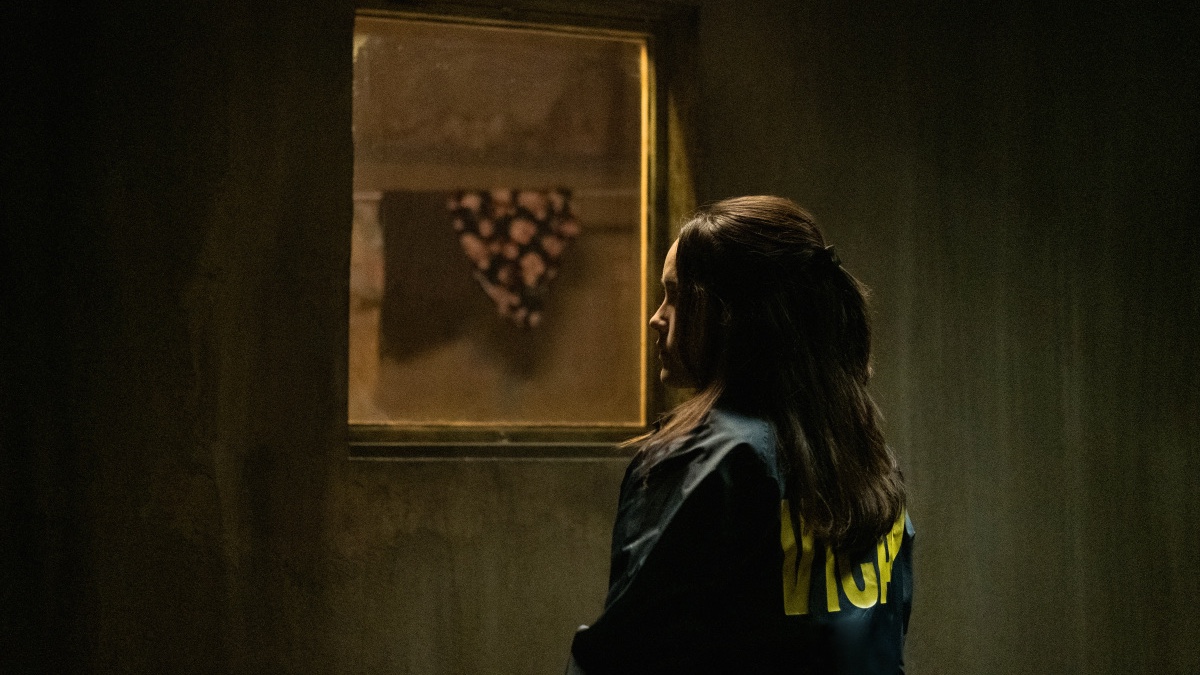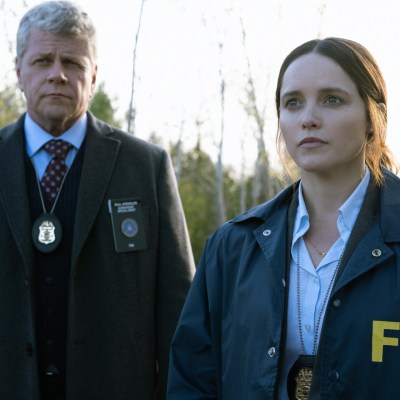This Clarice review contains spoilers.
Clarice Episode 2
Clarice episode 2, “Ghosts of Highway 20,” takes the series further from The Silence of the Lambs, and deeper into federal cop procedural territory. FBI Agent Clarice Starling (Rebecca Breeds) went rogue at the end of the debut episode, “breaking the chain of command” and telling the press that an apprehended suspect just might not be a serial killer, but part of something larger. Now she is waiting for repercussions.
Clarice is already doing penance as the episode opens, counting off pushups to metal music. Pushups are a military punishment for rookie infractions and, back in the ‘90s, heavy metal music was blasted at hostile prisoners of war. To further distance themselves, the VICAP squad gets deployed to Tennessee. Starling’s superior officer, Deputy Assistant Attorney General Paul Krendler (Michael Cudlitz), only called her up there to keep an eye on her.
This is not a serial killer situation. The leader Lucas Novak is “a standard-issue country gentleman, described as charismatic.” What started off as a “hillbilly rehab clinic” turned into a fringe militia group. Someone shot an “ATF agent, who is in stable condition, but they’re now in the middle of a standoff and don’t want another Waco, that was a cluster.” He doesn’t finish the word and that’s part of the problem of having something like this on network TV.
Regardless of the source material, any new ground which gets broken does it within such tight constraints. It’s not only the restrictions of words or offensive images, but the cookie cutter timelines of a network procedural. Cable procedurals get to cut a little deeper, but they’re usually as guilty. This is why shows like Mindhunter truly made waves. They break the formula, and throw off the timing, which makes the inherent suspense more effective and mysteries more unexpected.
Of course, we can expect rogue cops to do the unexpected. No sooner than the self-proclaimed knuckle-dragging agent in charge of Starling, Murray Clarke (Nick Sandow), tells her she shouldn’t be in the FBI, she goes running off following a flashback-inducing kid. It’s part of her MO. It is almost a running gag. A few moments after this, Agent Thomas Esquivel (Lucca De Oliveira) tells her she’s got to prove people can trust her, when she disappears from his viewfinder and stops calling on her walky-talky. It feels like they’re just giving her signposts on the road to rogue status.
Read more
In episode 1 it was established that Clarice is now a celebrity cop, having solved the “Buffalo Bill” case at great cost to herself. A lot of the agents are on record as thinking her high visibility is a drawback. Krendler greets her at the beginning of the episode by saying he’s putting her up for transfer because she clipped a federal case and drew attention to herself. “You’re Clarice Starling,” an FBI sniper says. “You’re all over the news. It’s a power play.” It’s almost a given that the “charismatic” militia leader Novak will only talk to the female agent the kid saw while she should have been out of sight. The same agent Novak saw on TV. As Humphrey Bogart’s Sam Spade might mockingly say in The Maltese Falcon, “This should put you in solid with your boss.”
Clarice is obviously answering to a higher authority, as much as this is exactly the thing pissing off her FBI co-combatants. Not only does she agree to walk into the backwoods fortress, but she goes in ready for her closeup. She’s pegged Novak as a narcissist, and it reflects well on her. On top of this, the attorney General also shows up bringing national media attention to a local matter which no one would otherwise care about.
The show does have a way with settings, however. I don’t think I’ve ever seen creepier string beans than the ones strung up like tiny corpses inside the Statesmen’s headquarters. While I admit that’s an overstatement, the first time the beads appear they look like they’re framing a crime scene, rather than one to come. Novak does his best to live up to the charismatic reputation, cooing at the agent while he softens her skin with lotions, trying to pick at her southern brain as well as its left hemisphere.
The battlefield on the series is on the turf of psychological warfare, which is a familiar minefield for Starling. She dodges verbal bullets from her bureau-ordered therapist; ducks hair-triggered PTSD bombs; and dances around territorial alpha male supremacy shrapnel. If anyone’s going to find a hidden den of sex slaves and a statewide clique of authorities with blackmail fetishes, it’s going to be Agent Starling. She’s also going to find the narcissist’s weak spot, the prime suspect’s blind spot, and the elusive shooter. She has a knack for being in the wrong place at the right time.
The acting is top notch all around, but the main character only really connects with the weekly villain. When Clarice drops seconds before a decisive sniper shot, it gives closure to the earlier conversation about trust. But the trust between characters is broken moments later when politicians protect their own. Clarice frames it as if they’re borrowing against the future, but it is complicity, and ultimately broadcast copaganda. Bad cops can be trusted to resign when they’re caught, no need for trials. Everyone’s got a thing for daddy, and the most prominent father figure is a long-dead cop, who died doing his duty.
“Ghosts of Highway 20” adds to the mystique of Agent Starling because she is once again proven right in all the wrong ways. The episode’s suspense is amplified by the subtle sexual subtext, but dampened by the contrived structure. Clarice still hasn’t proven whether Clarice is brilliant or lucky, and we can be sure she’s going to have to start at square one again on the next case.
Clarice airs Thursdays at 10:00 p.m. on CBS.

